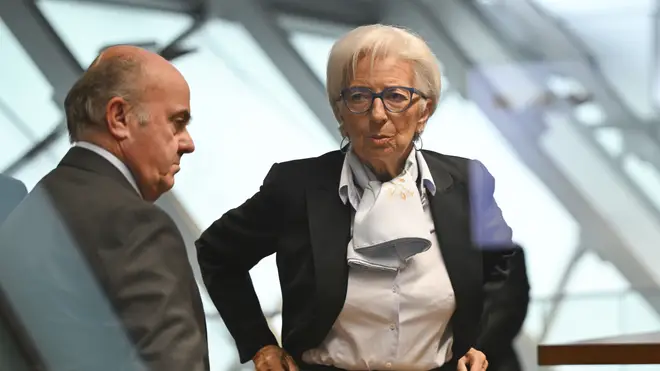
Tonight with Andrew Marr 6pm - 7pm
11 April 2024, 14:44

Bank president Christine Lagarde said that while ‘measures of underlying inflation were easing’, price pressures remained strong.
The European Central Bank has left its key interest rate benchmark unchanged, choosing to wait for confirmation that rapidly receding inflation is firmly under control before cutting rates to support an economy that is struggling to grow.
Bank president Christine Lagarde said after the meeting that while “measures of underlying inflation are easing”, price pressures remained strong and were keeping prices high in the services sector.
But she also suggested a rate cut was now on the table, saying that if incoming data confirmed inflation’s decline, “it would be appropriate to reduce the current level of monetary policy restriction”.
The policy meeting at the bank’s skyscraper headquarters in Frankfurt is widely regarded as a prelude to a likely rate cut at the next meeting on June 6, after Ms Lagarde dropped a broad hint by saying that the bank would have more information on the path of inflation at that meeting.
Ms Lagarde’s statement meant that the bank “officially opens the door to a June rate cut”, said Carsten Brzeski, chief of global macro at ING bank.
“This is the first time the ECB has talked about rate cuts in its official policy announcement.”
The decision comes as the world’s central banks including the ECB and the US Federal Reserve are weighing when receding inflation will let them cut rates – and make credit cheaper for businesses and consumers.

It is a policy shift closely watched by stock investors, after markets soared in recent months on expectations of lower rates by this summer.
Broad stock market indexes fell immediately in the US on Wednesday and bond prices rose after a hotter than expected inflation report raised fears that the Fed may wait longer than previously thought to lower its benchmark interest rate.
The ECB and the developed world’s other central banks are tilting towards undoing some of the sharp hikes to interest rates that were imposed with the goal of getting inflation under control.
The Swiss National Bank was the first major central bank to cut rates in the current cycle on March 21. The big exception is Japan, which raised rates for the first time in 17 years on March 19.
Higher rates help squash inflation by raising the cost of borrowing to buy things, which can cool demand for goods — but they can also slow growth if overdone or maintained for too long. And growth in Europe has been anaemic, with the eurozone economy failing to grow at all in the last three months of last year and the outlook for the figures from the quarter just ended not much better.
The ECB is teeing up a cut even as uncertainty grows over the prospect of a first rate cut from the US Federal Reserve.
US annual inflation of 3.5% in March and robust US jobs figures suggesting strong growth have led to questions about whether the Fed will carry through with the three rate cuts that it had signalled for this year.
Analysts now think the US cuts could be fewer or could come later than originally expected.
Rate cuts can boost stocks because they suggest the central bank sees a strong economy ahead that will boost corporate profits, and because lower interest rates make stocks relatively more attractive compared with interest-bearing holdings such as bonds or CDs.
The price spike in Europe was spurred by an outside shock: Russia cutting off most supplies of cheap natural gas after its invasion of Ukraine.
The energy crisis came on top of logjams in supplies of raw materials and parts as the economy bounced back from the pandemic slowdown.
These issues have largely eased as energy prices have fallen to pre-war levels and as supply chain frictions have eased.
But services inflation remains sticky, and the ECB wants to see more data on wage increases.
While the European energy shock is over, US demand for goods remains buoyant.
This means the inflation decline is “more predictable” in Europe, according to Erik F Nielsen, UniCredit group chief economics adviser.
“The US inflation hump was comparatively driven more by excess demand than European inflation, created by the vastly expansionary US fiscal policy,” he wrote.